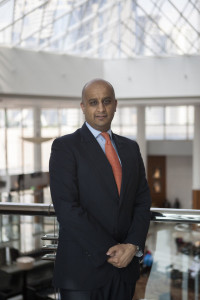 For Benvir Padda, Director of IT, Legatum, being in control has always been a matter of necessity. Whether that means taking care of all things technology at the Downtown Dubai financial firm, or quitting his university course after one year to engineer a move into the networking business, Padda has always been compelled to be master of his own destiny.
For Benvir Padda, Director of IT, Legatum, being in control has always been a matter of necessity. Whether that means taking care of all things technology at the Downtown Dubai financial firm, or quitting his university course after one year to engineer a move into the networking business, Padda has always been compelled to be master of his own destiny.
Born and educated in Crawley, 30 miles south of London, Padda’s family moved to South Wales, United Kingdom, when he was 16. He began his IT training there at Afan College, Port Talbot, where he fondly recalls how in the midst of achieving his first qualifications, he found time for a bit of mischief, “Like a lot of other young guys who were into IT I loved certain computer games,” he says. “The online interaction you could achieve from playing games like Doom really impressed me, and spawned my initial fascination with networking.” A cheeky grin spreads across his face. “The Novell and BNC networks really impressed me back in those days, and really inspired me and a couple of friends to start a cat-and-mouse game with the college network administrators. We eventually succeeded in acquiring their passwords, and gained all the subsequent admin privileges. My interest in networking really took off after that.”
After four years in the Welsh town, his family returned to Crawley, and he began a computing degree at Thames Valley University in west London. The move was to be a brief one; after a year on the course, Padda decided he’d had enough. “The course just wasn’t right for me; I preferred networking to programming – which the course mainly entailed – and I had an entrepreneurial hunger inside myself that needed satisfying,” he says. “At that age I just wanted to get my hands dirty. I left the course and started sending out my CV.”
He landed a job as a Support Engineer at pharmaceutical research firm Covance, where he “Effectively started from the bottom, working both as a means of first and second line support.”
In 1998, after a year at the company, Padda’s youthful zeal had been recognised by his employers, and he was promoted to being in charge of European Support, where he was responsible for the company’s other Euro offices. He describes his role as being the “Flying IT doctor” of the company, as he was so frequently travelling across the continent, eliminating technical threats.
Soon enough, the ambitious 23-year-old’s dream job became vacant. The chance to become European Team Leader was one that Padda had coveted. His pursuit of the role opened his eyes to the harsh reality of corporate culture, “They said I was too young for the position,” he recalls. “At that point I realised that hard work simply wasn’t enough. I had always believed it to be a pre-requisite of success, but at that stage it counted for nothing. I was more than qualified, but I was essentially a victim of prejudice, if my age was what discounted me.” From that point, Padda was clear about the type of organisation he wanted to work for, “I believe that recognising and fostering talent is a key duty of any good company. Covance didn’t do that, so I left.”
In 1999, he joined airline ticket reservation firm Galileo International, working as a Senior LAN analyst in Windsor, at the company’s EMEA head office. He was immediately charged with overseeing Y2K operations, as well as establishing company offices in the EMEA region. Whilst providing technical support to the Dubai office, he met Galileo’s GM, and Padda joked about being offered a full time job in the Emirate. Luckily for him, his colleague didn’t see the funny side. In 2001 he proudly accepted the role of Network Designer for Galileo’s MEA office, where he was responsible for implementing online systems for booking flights, hire cars and hotels. The contrast in his treatment from his time at Covance lives fresh in the memory, “At Galileo I had the chance to build; I was able to influence IT strategy, and I had fantastic exposure to the industry,” he says. “My mentality evolved into believing I could grow as a manager, and could really shape my career.”
Following the 11th September terrorist attacks on New York’s World Trade Centre in 2001, Galilieo decided to downsize in the in the region, cancelling the plans to build the $1 billion global IP network. While their faith in the Middle East was extinguished, Padda’s endured. He was convinced of Dubai’s long-term potential, and decided to stay. He took a sabbatical, and resumed work as Assistant Manager of Infrastructure at Dubai Duty Free in 2002. Whilst there, he was responsible for implementing point-of-sale infrastructure, revamping hardware and training 800 staff.
In 2004 financial firm Legatum came knocking for his services, and enlisted him to head up global IT operations, and implement strategies for the group. He has since been a mainstay at the company; the opportunity and trust granted to him clearly hitting the right notes. In his 10 years there he has overseen a plethora of projects, including implementing a tier three data centre, a unified communication strategy, and setting up operations in London, Middle East, Far East and U.S. “We’ve come a long way in 10 years. I’ve had to align business and IT objectives, and have always had to ensure first class customer service,” he says. “I’ve been in charge of implementing a document management system, and building a custom front end, which is unlike anything else in the market. We’ve also installed Aruba Wi-Fi throughout our building in DIFC and have ultimately created a world class infrastructure.”
Looking back, Padda’s decision to plan for a future in Dubai seems inspired. He says that he never doubted the region’s potential, “When I moved to Dubai back in 2001, it was something of an unknown. A lot has changed since then, but back then I felt a connection with the place, I thought “This is a city that’s going places, this is somewhere that wants me to grow with it.”” The city’s current technology initiatives continue to impress the man, “I love the fact that Dubai has an ‘Internet City’, an area dedicated completely to technology. This is a city that’s embracing technology, as everyone should. Just look at Dubai’s mission to become a smart city, that tells you all you need to know about the ambition of the place.”
So who has inspired Padda? “People in the public eye who I really looked up to were entrepreneurs like Richard Branson, Bill Gates and Warren Buffet. Branson & Gates both dropped out of school, but they knew what they wanted to do, and that’s what I respect. They weren’t afraid to take a risk and make things happen for themselves, and I think you have to admire that,” he says. “On a personal level, the founder of Legatum and the values of the company have truly been life changing for me, the phrase ‘The Most valuable thing in life is not ‘what we get’ but ‘who we become’ is one that I live by. In order to do that, you must always maintain two things: control but also display humility.”











